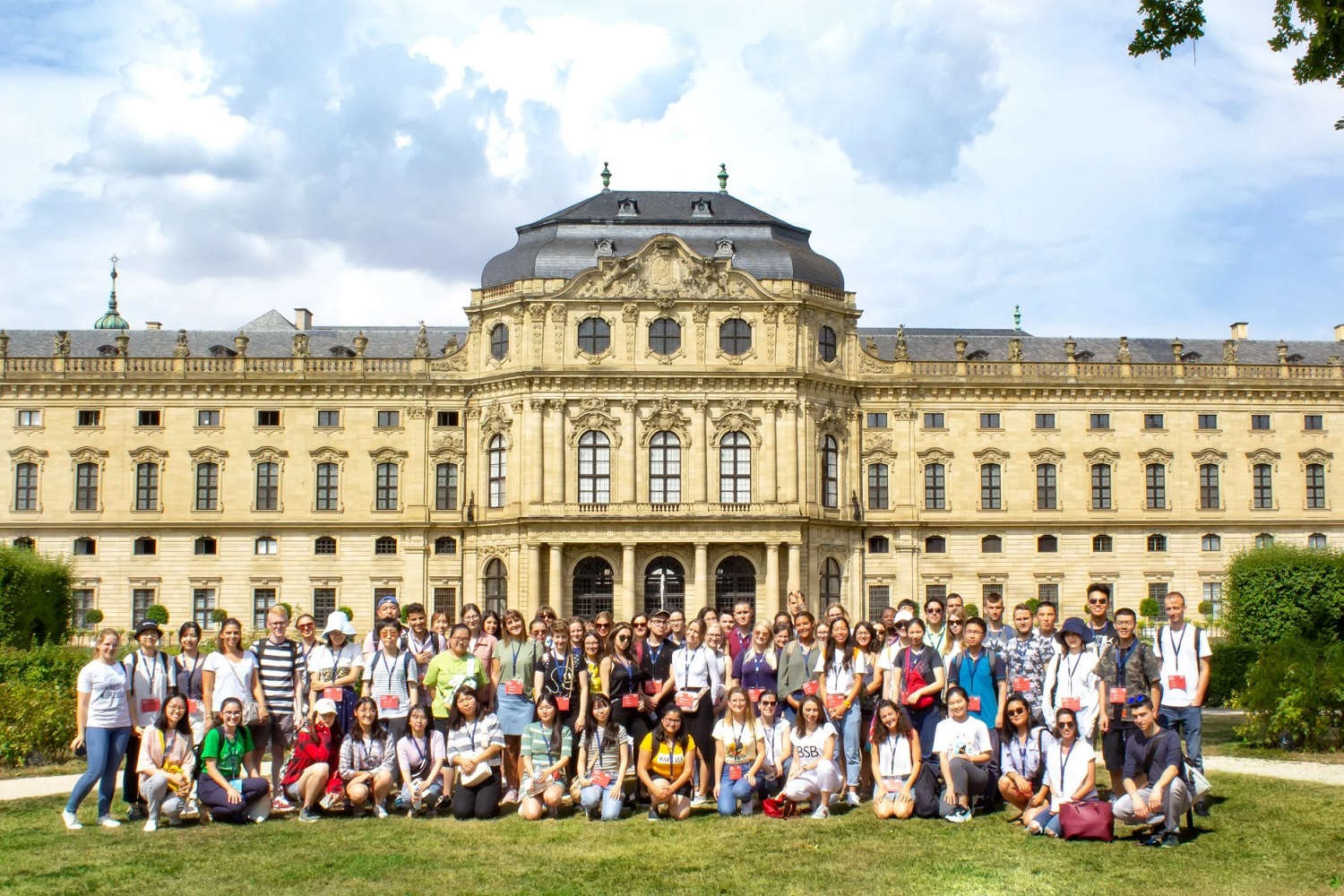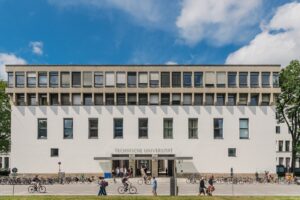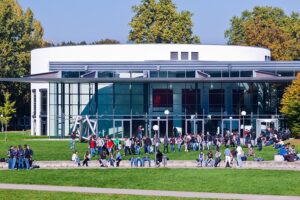
University of Wurzburg
The University of Würzburg maintains high academic standards and is consistently ranked among the top universities in Germany. It attracts renowned professors and researchers who are leaders in their respective fields. The university’s commitment to excellence is reflected in its rigorous academic programs, state-of-the-art research facilities, and a strong emphasis on critical thinking and intellectual inquiry. it is known as Julius-Maximilians-Universität Würzburg, is a public research university located in Würzburg, Bavaria, Germany, It was founded in 1402 and is one of the oldest universities in Germany. It has a long-standing tradition of academic excellence and is highly regarded for its research and teaching. The university has produced numerous distinguished scholars, including Nobel laureates and renowned academics.
The University of Würzburg actively engages in international research cooperation and collaborates with renowned universities and research institutions worldwide. These collaborations enable researchers to work on joint projects, share expertise, and access international funding opportunities. The university’s international research networks contribute to the global exchange of knowledge and foster a diverse research environment.
The University of Würzburg places a strong emphasis on internationalization and maintains partnerships with universities and research institutions worldwide. It actively promotes student and faculty exchange programs, joint research projects, and international collaborations. These partnerships enhance the university’s academic and research capabilities and provide opportunities for students and researchers to gain international exposure and perspectives.
The University of Würzburg offers a range of international exchange programs, allowing students to study abroad and experience different academic and cultural environments. These programs include partnerships with universities around the world, enabling students to broaden their perspectives, enhance their language skills, and develop intercultural competence.
Research and Innovation
The University of Würzburg is home to several interdisciplinary research centers that bring together researchers from different disciplines to tackle complex scientific and societal challenges. These centers focus on areas such as neuroscience, infectious diseases, photonics, integrative biodiversity research, and digital humanities. The interdisciplinary approach facilitates collaboration, knowledge exchange, and innovative research outcomes and it is recognized for its strong research capabilities and is involved in numerous research projects, both nationally and internationally, The university’s research activities cover a wide range of fields, including life sciences, medicine, natural sciences, humanities, social sciences, and economics. The university actively promotes interdisciplinary research collaborations and encourages innovation and knowledge exchange.
Furthermore, The university’s library system is extensive and includes several specialized libraries, providing students and researchers with access to a wide range of resources. The university also has well-equipped laboratories, research centers, and institutes that support cutting-edge research and facilitate collaboration among faculty and students.
The University of Würzburg has made significant contributions to various fields of research. It has been involved in groundbreaking discoveries and advancements in areas such as physics, chemistry, biology, neuroscience, and astronomy. Researchers at the university have been at the forefront of their respective fields, publishing influential papers and receiving prestigious grants and awards.
Collaborative Research Centers
The university hosts several Collaborative Research Centers (CRC) funded by the German Research Foundation (DFG). These CRCs bring together researchers from different disciplines to work on long-term, interdisciplinary research projects. The collaborative nature of these centers promotes knowledge exchange, fosters innovative research, and strengthens the university’s research capabilities.
Strong Emphasis on Interdisciplinarity
The University of Würzburg promotes interdisciplinary collaboration and encourages researchers and students to work across traditional disciplinary boundaries. It supports interdisciplinary research projects and initiatives, as well as interdisciplinary study programs that combine multiple disciplines to address complex societal challenges.
International Research Networks
The university actively participates in international research networks and projects. It collaborates with universities, research institutions, and industry partners from around the world to address global research questions. The university’s researchers are involved in international conferences, workshops, and research exchanges, facilitating cross-cultural collaborations and knowledge sharing.
Graduate Schools and Research Training
The University of Würzburg offers structured research training programs through its graduate schools. These programs provide specialized training, mentoring, and support to doctoral students, enabling them to pursue high-quality research and develop transferable skills for their future careers. The graduate schools also foster interdisciplinary collaboration and provide a vibrant intellectual community for doctoral students.
Career Services and Alumni Network
The university provides career services and support to help students transition into the workforce. It offers career counseling, job placement assistance, internships, and networking opportunities. The university’s strong alumni network provides a valuable resource for students and graduates, offering mentorship, professional connections, and potential career prospects.
The university offers mentoring programs and career development support for its students and alumni. Through these initiatives, students can connect with successful alumni who provide guidance, advice, and networking opportunities. The university’s career services provide resources such as job fairs, interview preparation, and internship placements to facilitate students’ transition into the workforce.
The University of Würzburg boasts an impressive list of notable alumni who have achieved success in various fields. These include Nobel laureates, renowned scientists, influential politicians, successful entrepreneurs, and acclaimed artists. The university’s alumni network provides a platform for collaboration, mentorship, and professional networking among graduates.
Technology Transfer and Entrepreneurship
The University of Würzburg actively promotes technology transfer and entrepreneurship. It encourages researchers and students to translate their innovative ideas into practical applications and supports the creation of start-up companies. The university’s Tech Transfer Office guides intellectual property, patent applications, and industry collaborations, facilitating the commercialization of research outcomes.
The university is committed to sustainability and environmental responsibility. It has implemented various initiatives to reduce its environmental impact and promote sustainable practices. The university’s Sustainability Office works on projects related to energy efficiency, waste management, and sustainable campus development. Sustainability is also integrated into the curriculum, with courses and research projects addressing environmental and social issues.
The university’s library system is extensive and offers access to a vast collection of books, journals, and digital resources. The libraries provide modern study spaces, research support, and access to specialized databases and archives. The university is committed to expanding its digital resources and offers online access to a wide range of academic materials.
International Research Cooperation:
Cultural Heritage and Museums: Würzburg is known for its rich cultural heritage, and the university plays an important role in preserving and showcasing this heritage. The university’s collections include valuable artifacts, artworks, and scientific specimens. It operates several museums and exhibition spaces, allowing students, researchers, and the public to explore and appreciate the region’s cultural and scientific history.
These additional details highlight the University of Würzburg’s excellence in medical education and research, interdisciplinary research centers, commitment to sustainability, support for international students, focus on technology transfer and entrepreneurship, comprehensive library system, international research collaborations, and contributions to cultural heritage. These factors contribute to the university’s reputation as a leading institution for education, research, and societal impact.
Language Courses and Student Support
The university provides language courses and support services for students who are non-native speakers of German. The Language Center offers German language courses at various levels to help international students improve their language proficiency. Additionally, the university provides language support for academic writing and presentations to assist students in their coursework and research.
The university places great importance on providing comprehensive support services to its students. These services include academic advising, counseling, and support for students with disabilities or special needs. The university also has a Career Service Center that assists students with career guidance, job placement, and internships, helping them transition smoothly into the job market.
Sports and Recreation: The university offers a variety of sports and recreational activities for students to stay active and maintain a balanced lifestyle. The university’s sports center provides facilities for various sports, including athletics, swimming, tennis, soccer, and more. Students can participate in sports clubs and teams, take fitness classes, or use the sports facilities independently.
Campus
The university provides housing options for students, including residence halls and apartments. The Studentenwerk Würzburg, a student services organization, manages student housing and assists students in finding suitable accommodation. Living on campus or near the university facilitates easy access to academic resources, extracurricular activities, and a vibrant student community.
The university offers comprehensive support services for international students, ensuring a smooth transition and successful academic experience. These services include assistance with visa and immigration procedures, orientation programs, language courses, and cultural integration activities. The International Office provides guidance and support throughout the student’s stay at the university, fostering a welcoming and inclusive environment.
The University of Würzburg actively engages with the local community and participates in outreach programs. Through initiatives such as public lectures, science festivals, and collaborations with local schools, the university fosters knowledge dissemination and promotes science education among the wider community. These activities contribute to the university’s role as a hub for intellectual and cultural exchange.
The university offers a vibrant campus life with a wide range of cultural and student organizations. These organizations cover diverse interests, including music, theater, film, photography, debate, entrepreneurship, and social activism. Students can join these groups to pursue their passions, connect with like-minded individuals, and engage in extracurricular activities.
Faculties and Disciplines
The university offers a wide range of disciplines across various faculties. This diverse range of faculties and disciplines allows students to pursue a broad spectrum of academic interests.
The university’s Faculty of Medicine is particularly renowned for its excellence in medical education and research. It has a long-standing tradition of medical innovation and is known for its contributions to various medical fields. The university’s medical faculty collaborates closely with local hospitals and research institutes, providing students with practical training opportunities and fostering advancements in healthcare.
The university offers a variety of graduate programs and doctoral studies for students seeking advanced degrees. These programs provide in-depth knowledge and research opportunities in specific fields of study. The university’s graduate schools provide structured programs and support services to enhance the academic and professional development of graduate students.
The University of Würzburg offers a selection of courses and degree programs that are taught in English. While the availability of specific courses may vary from year to year
International Master’s Programs
The university offers various international master’s programs that are entirely taught in English. Examples include Master’s in English and American Studies, Master’s in Biological Sciences, Master’s in Computer Science, and Master’s in Mathematics.
English-taught Bachelor’s Programs
Some bachelor’s programs at the University of Würzburg also offer English-taught courses. For example, the Bachelor’s in Economics and Business Administration offers courses in both English and German.
Summer Schools and Intensive Courses
The university organizes summer schools and intensive courses that are conducted in English. These short-term programs cover a wide range of subjects and are open to both domestic and international students.
Exchange Programs
The University of Würzburg participates in various international exchange programs, allowing students from partner universities to take courses taught in English during their exchange period.



